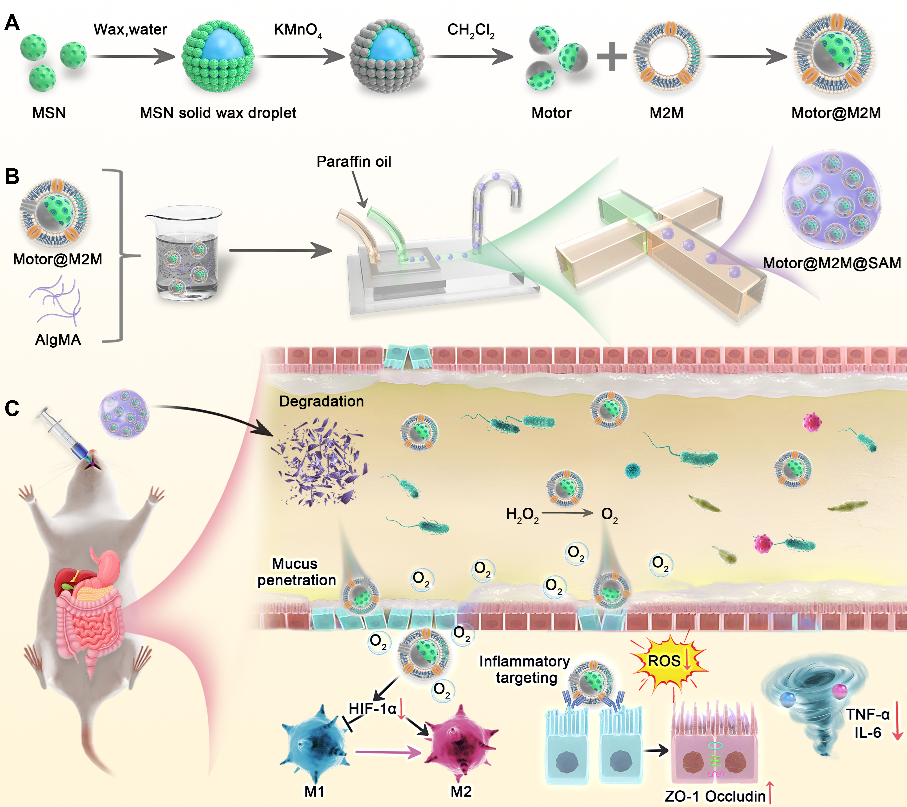A research team led by Wang Ruibing, professor at the Institute of Chinese Medical Sciences (ICMS) at the University of Macau (UM), has developed a novel oral formulation for the targeted therapy of ulcerative colitis. The research results have been published in the prestigious international journal Science Advances.
Ulcerative colitis, a type of inflammatory bowel disease, is a common inflammatory disease of the gastrointestinal tract. Although oral anti-inflammatory medications are the preferred method for patients, clinical outcomes are often unsatisfactory due to challenges including poor drug accumulation, limited penetration of mucus barrier, and insufficient elimination of reactive oxygen species (ROS) and inflammatory cytokines. Therefore, it is critical to develop an oral formulation that can effectively penetrate the mucus barrier, accumulate in inflamed tissue, and eliminate inflammatory factors and ROS.
The research team had previously developed macrophage-based nanodrugs and macrophage sponges for the targeted therapy of inflammatory diseases such as atherosclerosis and acute pneumonia, and had published two research articles in Nature Communications. However, both of them are injectable formulations that are not suitable for oral administration to treat intestinal inflammation and are unable to actively penetrate the mucus barrier.
Building on the previous research, the research team then developed an oral medication that does not contain small-molecule drugs. This formulation uses asymmetric M2 macrophage membrane-coated Janus nanomotors (M2 macrophage-biomimetic nanorobots) embedded in sodium alginate hydrogel microspheres. The sodium alginate microspheres ensure the stability of the nanomotors in the harsh gastric environment and release them into the intestinal tract. The M2 macrophage membrane enhances the delivery efficiency of the nanomotors to the inflammatory colon and acts as a nanosponge to effectively neutralise inflammatory factors. Additionally, the propelling force of oxygen generated by the catalytic consumption of hydrogen peroxide facilitates the penetration of nanomotors through the colonic mucus barrier into inflammatory tissues. This process eliminates ROS, alleviates tissue hypoxia, polarises macrophages, and reduces colonic epithelial cell apoptosis.
The research is published in the prestigious journal Science Advances under the title ‘Oral microsphere formulation of M2 macrophage-mimetic Janus nanomotor for targeted therapy of ulcerative colitis’. Prof Wang is the corresponding author, and Gao Cheng, research assistant professor at ICMS, is the co-corresponding author. UM PhD candidate Luo Ruifeng, MPhil student Liu Jinwei, and Cheng Qian, PhD graduate of UM and associate professor at Chengdu University of Traditional Chinese Medicine, are the co-first authors. The research project was funded by the Science and Technology Development Fund of the Macao SAR (File No: 0047/2023/AMJ, 0086/2022/A2, 005/2023/SKL, 0001/2023/RIA1, 0070/2023/RIA2, and 0006/2022/ITP) and UM (File No: MYRG2022-00081-ICMS). The full version of the research article is available at https://www.science.org/doi/10.1126/sciadv.ado6798.
| Source: Institute of Chinese Medical Sciences | |
| Media Contact Information: | |
| Communications Office, University of Macau | |
| Albee Lei | Tel: (853) 8822 8004 |
| Cravina Chong | Tel: (853) 8822 4323 |
| Email: | prs.media@um.edu.mo |

